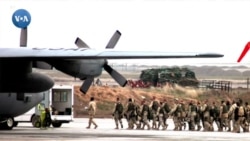U.S. veterans who served in Karshi Khanabad (K2), where the U.S. had an airbase in 2001-2005, claim they were exposed to toxic materials and radiation in Uzbekistan. VOA Uzbek visited the area recently, engaging the public and regional authorities, who deny any adverse effects on their health, stressing that "our area is not toxic."
Interview with Mark Jackson, board chairman of the Stronghold Freedom Foundation, which represents thousands of retired and active American military personnel showcases these dueling views between two countries.
There is no dispositive scientific analysis or factual proof yet, but recently revealed U.S. official documents do indicate that the Pentagon and other relevant entities suspected K2 could have hazardous chemicals leftover from its days as a Soviet military facility. Thousands of Uzbek Air Force members are still based at the site, and about 7,000 people live in the vicinity of the base.
The Johns Hopkins University is conducting an 18-month long longitudinal epidemiological study among American veterans of K2. This research was authorized by President Trump in early 2021. Jackson and his organization argue that the conditions from which U.S. veterans suffer stemmed from their service in Uzbekistan. They urge the U.S. Department of Veteran's Affairs to treat these patients accordingly, offering proper medical care and coverage.
Interview with Mark Jackson, board chairman of the Stronghold Freedom Foundation, which represents thousands of retired and active American military personnel showcases these dueling views between two countries.
There is no dispositive scientific analysis or factual proof yet, but recently revealed U.S. official documents do indicate that the Pentagon and other relevant entities suspected K2 could have hazardous chemicals leftover from its days as a Soviet military facility. Thousands of Uzbek Air Force members are still based at the site, and about 7,000 people live in the vicinity of the base.
The Johns Hopkins University is conducting an 18-month long longitudinal epidemiological study among American veterans of K2. This research was authorized by President Trump in early 2021. Jackson and his organization argue that the conditions from which U.S. veterans suffer stemmed from their service in Uzbekistan. They urge the U.S. Department of Veteran's Affairs to treat these patients accordingly, offering proper medical care and coverage.


















Facebook Forum